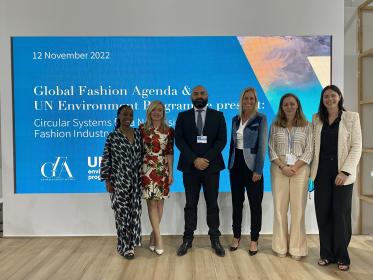Organic Cotton & Textiles Conference in India
The Organic Cotton & Textiles Conference, taking place in Indore, India over three days, from February 27-March 1st is set to bring together a diverse group of key players from every part of the textile supply chain. Farmers, farm groups, industry representatives, non-profits, academics, suppliers, brands, certifiers, government representatives and policymakers will join nearly 200 guests at the multi-day event. The aim is to foster collaboration, explore innovative ideas, listen to those on the ground and focus discussions to develop a shared vision to boost the organic textile supply chain worldwide.
Co-hosted by OCA, GOTS, and IFOAM - Organics International, the conference will address a range of subjects including social conditions, transparency through innovation, scaling up organic through investment, as well as sessions tackling certification, decent work and environmental impacts. The event also gives voice to farmers, who join as panellists, in a dedicated Q&A session with seven organic cotton farmers from the region. On the third day, organised by OCA, the organic farmers will welcome attendees to their communities during field trips west to Petlawad to witness organic practices at ground level.
“By addressing these important issues and fostering a dialogue between participants, the conference aims to develop innovative solutions that can drive progress and growth in the sector", says Bart Vollaard, Executive Director of OCA. "We are thrilled to be joining forces with GOTS and IFOAM to create positive change in the organic textile sector."
“Together with IFOAM - Organics International and OCA, GOTS wants to increase visibility of organic and at the same time enhance integrity of organic fibres and textiles. This conference shall serve to strengthen the sector by addressing obstacles and work on effective solutions, in consultation with all relevant and committed stakeholders”, notes Claudia Kersten, Managing Director of GOTS.
Sarah Compson of the IFOAM - Organics International World Board adds “Organic agriculture directly addresses some of the most pressing challenges of our time. IFOAM - Organics International is delighted to collaborate with OCA and GOTS to bring together people from across the whole textile sector and address the barriers and opportunities for scaling organic cotton production worldwide.”
With a strong line-up of notable speakers and guests in a supportive and engaging atmosphere, and a unique approach that connects participants from every step of the supply chain, the Organic Cotton & Textiles Conference is set to be a valuable and transformative event for key stakeholders involved in the organic textile industry.
GOTS






























